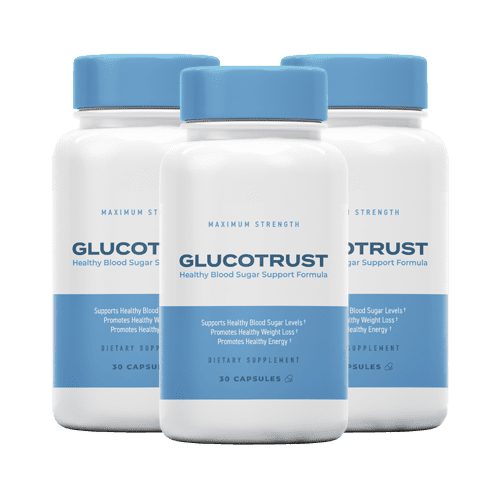Understanding and Managing GlucoTrust Side Effects: What You Need to Know
GlucoTrust is a nutritional supplement formulated to support healthy blood sugar levels. Although GlucoTrust is marketed as a natural solution with minimal side effects, like any supplement or medication, it’s essential to understand the potential risks and drawbacks before using it. This article will help provide an understanding of the possible side effects of GlucoTrust.
Common Side Effects:
1. Digestive Problems: Many dietary supplements can cause digestive issues such as gas, bloating, diarrhea, or constipation, especially when first beginning to take them. If you experience persistent digestive problems after taking GlucoTrust, you should stop using the product and consult your healthcare provider.
2. Allergic Reactions: Some people might be allergic to one or more of the ingredients in GlucoTrust. Symptoms of an allergic reaction can include itching, rash, swelling, severe dizziness, or trouble breathing. If you experience these symptoms after taking GlucoTrust, seek medical attention immediately.
3. Drug Interactions: If you’re currently taking any other medications or supplements, GlucoTrust may interact with them in ways that can affect their effectiveness or cause additional side effects.
4. Remember, it’s essential to talk with your doctor before starting any new supplement, including GlucoTrust. They can provide guidance based on your specific health history and current medications. This information is intended to serve as a general guide and may not cover all potential side effects and precautions.
Common Glucotrust Side Effects and How to Manage Them
Based on the potential side effects of similar dietary supplements, here’s a general guide on what you could experience and how to manage these side effects:
1. Gastrointestinal Issues: Nausea, Diarrhea, and Stomach Pain:
Dietary supplements can sometimes cause gastrointestinal issues due to their high concentration of nutrients or specific ingredients. To manage these symptoms, try taking the supplement with a meal rather than on an empty stomach. If symptoms persist, you should stop using the supplement and consult your healthcare provider.
2. Hypoglycemia: Managing Low Blood Sugar Levels:
If GlucoTrust effectively lowers blood sugar levels, it’s theoretically possible it could cause hypoglycemia (low blood sugar) if combined with diabetes medication. Common symptoms include sweating, shakiness, weakness, hunger, and confusion. If you experience these symptoms, try consuming a quick source of sugar like fruit juice, regular (not diet) soda, or glucose tablets. Always discuss with your healthcare provider how to best manage your blood sugar levels when introducing a new supplement.
3. Weight Gain or Loss: Strategies for Maintaining a Healthy Balance:
Regular exercise and a balanced diet are crucial in managing weight. Some supplements can affect appetite or metabolism, potentially leading to weight changes. It might also be beneficial to track your daily caloric intake. If significant weight changes occur after starting GlucoTrust, consult a healthcare provider or dietitian to ensure your nutritional needs are met.
4. Allergic Reactions: Identifying and Addressing Potential Allergies:
Some individuals may be allergic to one or more ingredients in GlucoTrust. Allergic reactions can range from mild, such as skin rashes or itching, to severe, like difficulty breathing. If you suspect you’re having an allergic reaction, stop taking the supplement immediately and seek medical attention. It’s essential to know the ingredients in any supplement you take and to discuss potential allergies with your healthcare provider.
Precautions:
1. Pregnancy and Breastfeeding: If you are pregnant or breastfeeding, you must speak with your healthcare provider before using GlucoTrust. The effects of many dietary supplements on pregnant women, breastfeeding mothers, and their babies are not thoroughly researched.
2. Underlying Health Conditions: People with underlying health conditions, especially those related to the liver or kidney, should be cautious when taking dietary supplements, as these organs typically process supplements.
Buy Now
Here is a generalized discussion based on similar supplements and their workings, effectiveness, and benefits:
1. What is GlucoTrust, and How Does it Work for Diabetes?
GlucoTrust is a dietary supplement that supports healthy blood sugar levels. Supplements typically contain ingredients that assist in glucose metabolism and insulin sensitivity, which include Gymnema Sylvestre, Biotin, Chromium, Manganese, Licorice Root, Cinnamon, and Juniper Berries. By aiding in glucose metabolism and improving insulin sensitivity, supplements like GlucoTrust can theoretically help maintain stable blood sugar levels, which is crucial for people with diabetes.
2. The Effectiveness of GlucoTrust in Controlling Blood Sugar Levels:
The effectiveness of GlucoTrust or any supplement in controlling blood sugar levels depends mainly on its specific formulation and the individual taking it. Many ingredients commonly found in blood sugar support supplements have demonstrated some promise in scientific studies, but results often vary from person to person. It’s essential to note that supplements should not be used as a substitute for standard diabetes treatments but can be used alongside them to improve overall blood sugar control. Always discuss with your healthcare provider before starting any new supplement regimen.
3. Benefits of GlucoTrust for Diabetes Patients:
If GlucoTrust works as suggested, it may offer several benefits for people with diabetes. Helping to maintain stable blood sugar levels could help prevent blood sugar spikes and crashes that can lead to symptoms like fatigue, excessive thirst, and frequent urination. Additionally, better blood sugar control can help reduce the risk of long-term diabetes complications, such as heart disease, nerve damage, and kidney damage. However, it’s essential to remember that a healthy diet, regular exercise, and prescribed medication are the cornerstones of diabetes management. A supplement like GlucoTrust should be viewed as an additional tool, not a primary treatment. Remember, the specifics about GlucoTrust, its workings, effectiveness, and benefits should be obtained from the product manufacturer or a healthcare provider. It is also essential to remember that dietary supplements are not strictly regulated like prescription medicines, and their claims may not be backed by rigorous scientific research.
There’s no specific information available about the rare but severe side effects of GlucoTrust. Nonetheless, based on the general knowledge about dietary supplements, here are potential issues to watch out for:
1. Unveiling Rare Side Effects Associated with GlucoTrust:
While most side effects from supplements are relatively mild, rare but severe side effects can occur. For instance, liver or kidney damage may occur with high doses of certain supplements, mainly if used over a long period. Symptoms of liver damage may include yellowing of the skin or eyes (jaundice), severe nausea or vomiting, and unusual tiredness. Signs of kidney damage could consist of changes in the amount of urine or color of urine, swelling of the ankles/feet, or increased thirst.
2. Warning Signs and Symptoms Requiring Immediate Medical Attention:
In general, the following signs and symptoms associated with the use of dietary supplements should prompt immediate medical attention:
- Severe allergic reactions (anaphylaxis) include difficulty breathing, swelling of your face, lips, tongue, or throat, intense rash or hives, dizziness, or a fast heartbeat.
- Severe nausea, vomiting, or diarrhea that doesn’t improve over time.
- Signs of bleeding include vomiting or passing blood in your stools, unexplained nosebleeds, unexplained bruising, or purplish spots on the skin.
- Signs of mood changes include severe anxiety, depression, or thoughts of self-harm.
- Signs of infection, such as high fever, severe chills, sore throat, or mouth ulcers, especially if you feel unwell.
- Severe skin reactions include a rash covering a large body area, blisters, or peeling skin.
- Severe or persistent headache.
- When any other severe or persistent symptoms cause significant distress or discomfort, seek immediate medical attention if you experience any severe or concerning symptoms.
Minimizing Glucotrust Side Effects: Best Practices
While I can’t provide specific guidance on minimizing GlucoTrust side effects due to the lack of available data, I can give some general tips on reducing the potential side effects of dietary supplements. Here are some best practices:
- Lifestyle Tips for Reducing GlucoTrust Side Effects:
-
- Healthy Diet: Certain foods may enhance or reduce the effects of some supplements. Following a balanced diet can also help your body better process the supplement.
- Stay Hydrated: Drinking fluids can help your body metabolize supplements more effectively and potentially reduce side effects.
- Regular Exercise: Regular physical activity can support overall health and help your body better manage potential side effects.
- Importance of Following Prescribed Dosage and Schedule:
-
- Following the recommended dosage and schedule for GlucoTrust or any dietary supplement is vital. Taking more than the recommended amount can increase the risk of side effects.
- If you miss a dose, it’s usually best to take it as soon as you remember, but don’t double up amounts to make up for a missed one.
- Always follow the instructions provided by your healthcare provider or those printed on the supplement’s label.
- Effective Communication with Healthcare Providers for Optimal Management:
-
- Regularly communicating with your healthcare provider about your use of GlucoTrust can help identify potential side effects early and adjust your treatment plan as necessary.
- If you notice any side effects or changes in your health after starting GlucoTrust, let your healthcare provider know as soon as possible.
- Be open and honest with your healthcare provider about all other medications and supplements you’re taking to avoid potential interactions.
It’s crucial to remember that while dietary supplements like GlucoTrust can support health, they’re not a substitute for a healthy lifestyle or prescribed medications.
Alternative Options for Diabetes Management
Diabetes management typically requires a multi-pronged approach, combining lifestyle changes, medication, and sometimes complementary therapies. While GlucoTrust may be one tool in your arsenal, here are some alternative options:
- Exploring Other Medications for Diabetes Control: Depending on the type and severity of diabetes, different medications might be used. These can include:
-
- Metformin: This is often the first-line medication for type 2 diabetes. It works by improving your body’s sensitivity to insulin and reducing the amount of glucose your liver produces.
- Sulfonylureas: These medications help your body produce more insulin.
- Insulin therapy: Those with type 1 diabetes and some with type 2 diabetes may need insulin therapy.
There are also newer classes of drugs like DPP-4 inhibitors, GLP-1 receptor agonists, and SGLT2 inhibitors. Always discuss with your healthcare provider to find the best medication regimen.
- Complementary Therapies and Lifestyle Changes Supporting Diabetes Management:
Alongside medication, lifestyle modifications are crucial in managing diabetes.
These can include:
-
- Diet: A balanced diet rich in fiber and low in processed foods can help manage blood sugar levels.
- Exercise: Regular physical activity can help maintain a healthy weight and improve insulin sensitivity.
- Stress Management: Techniques like yoga, meditation, and mindfulness can help reduce stress levels, positively impacting blood sugar control.
Complementary therapies, like acupuncture or massage, might also help manage diabetes symptoms or complications, but these should always be used in conjunction with traditional treatments, not as replacements.
- Consulting Healthcare Professionals for Personalized Recommendations:
Diabetes is a complex condition, and what works best will vary significantly from person to person. Regular check-ups with healthcare professionals like endocrinologists, dietitians, and certified diabetes educators can help tailor your treatment plan to your needs.
Remember, while dietary supplements like GlucoTrust may provide some benefits, they should not be used as a substitute for professional medical advice and treatment. Always consult your healthcare provider before starting any new supplement or altering your treatment regimen.
Try My Healthy Meal Planner
Transform your meal planning with our Healthy Meal Planner GPT! This personalized tool helps you create balanced, organic meal plans tailored to your dietary needs and nutritional goals. Enjoy delicious recipe suggestions, easy grocery lists, and tips for efficient meal prep. Stay motivated and on track with our supportive, friendly guidance. Start your journey to a healthier you today!




